Operations and Service Management: A Tesco Case Study Report
VerifiedAdded on 2023/01/11
|11
|3221
|96
Report
AI Summary
This report provides a comprehensive analysis of operations and service management practices, specifically focusing on Tesco. The report begins with an introduction to operational management and its significance, followed by an examination of a specific operations management practice within Tesco, potentially value chain analysis. The core of the report critically analyzes the efficiency and impact of this practice on the organization, exploring advantages, disadvantages, and the application of relevant theories such as business process design and lean theory. Further, the report evaluates the impact of technology, including blockchain, e-procurement, and IoT, on various processes within Tesco. Finally, it identifies and assesses the supporting functions linked to the selected operations management practice and their contribution to organizational success. The report utilizes academic theory and company research to support its findings, providing a detailed overview of Tesco's operational strategies and their effectiveness.
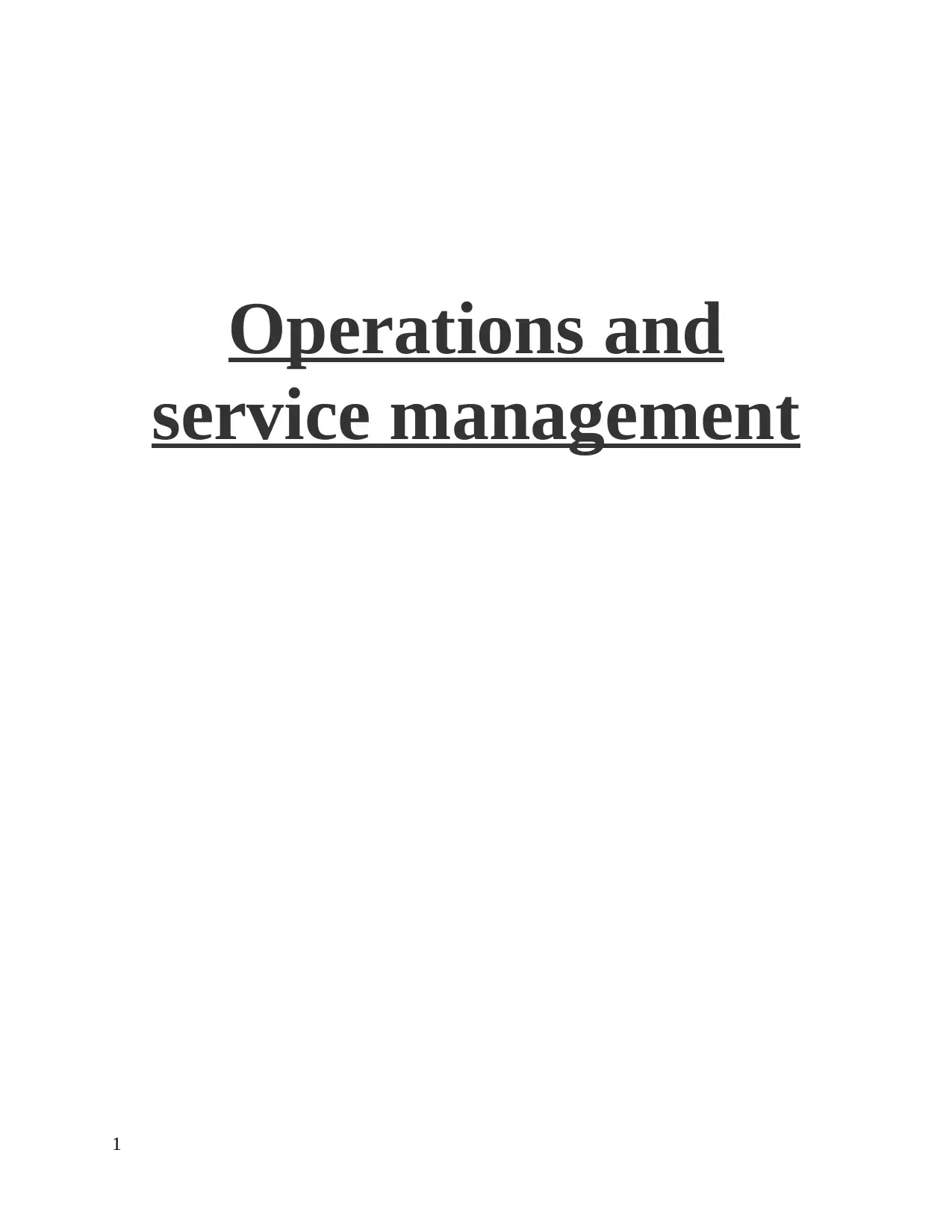
Operations and
service management
1
service management
1
Paraphrase This Document
Need a fresh take? Get an instant paraphrase of this document with our AI Paraphraser
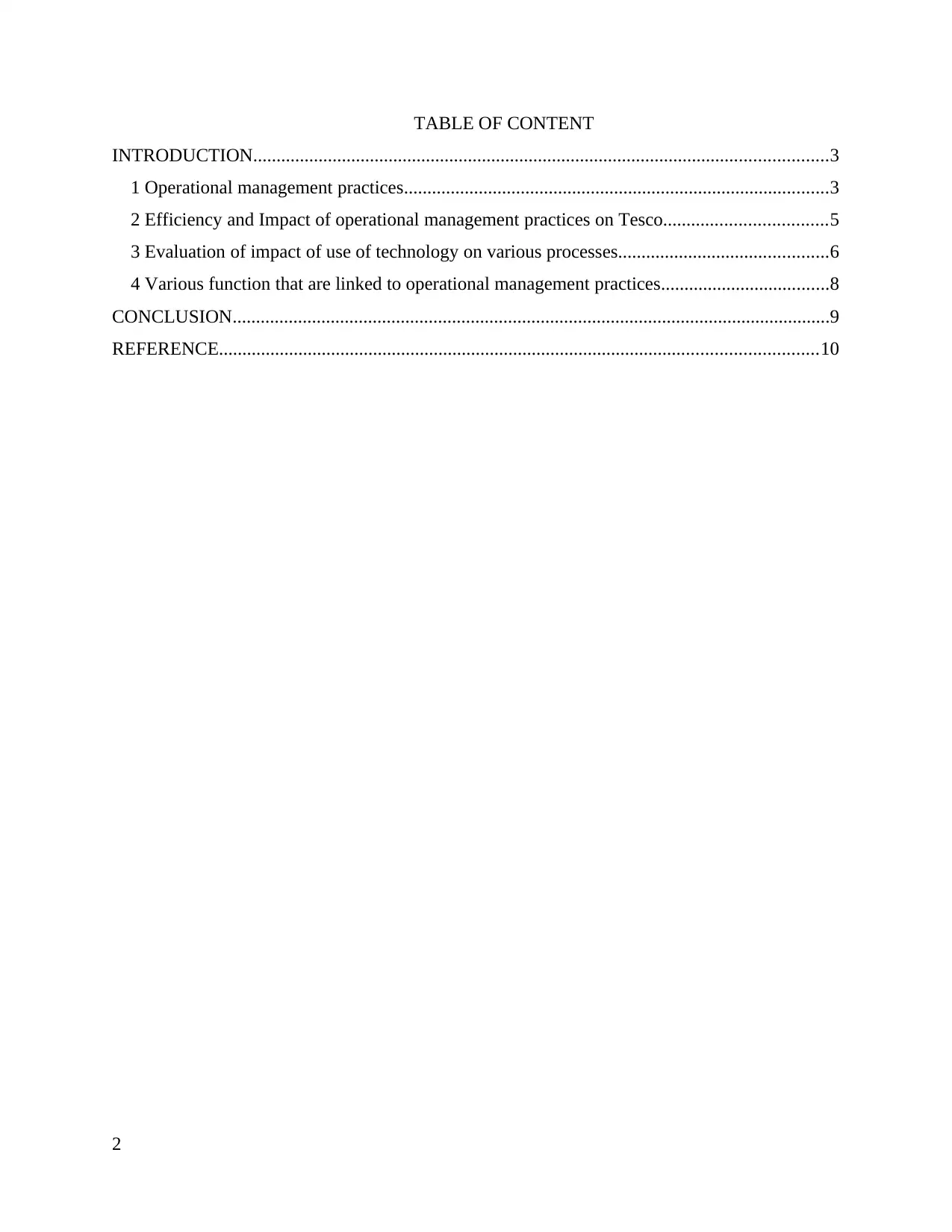
TABLE OF CONTENT
INTRODUCTION...........................................................................................................................3
1 Operational management practices...........................................................................................3
2 Efficiency and Impact of operational management practices on Tesco...................................5
3 Evaluation of impact of use of technology on various processes.............................................6
4 Various function that are linked to operational management practices....................................8
CONCLUSION................................................................................................................................9
REFERENCE................................................................................................................................10
2
INTRODUCTION...........................................................................................................................3
1 Operational management practices...........................................................................................3
2 Efficiency and Impact of operational management practices on Tesco...................................5
3 Evaluation of impact of use of technology on various processes.............................................6
4 Various function that are linked to operational management practices....................................8
CONCLUSION................................................................................................................................9
REFERENCE................................................................................................................................10
2
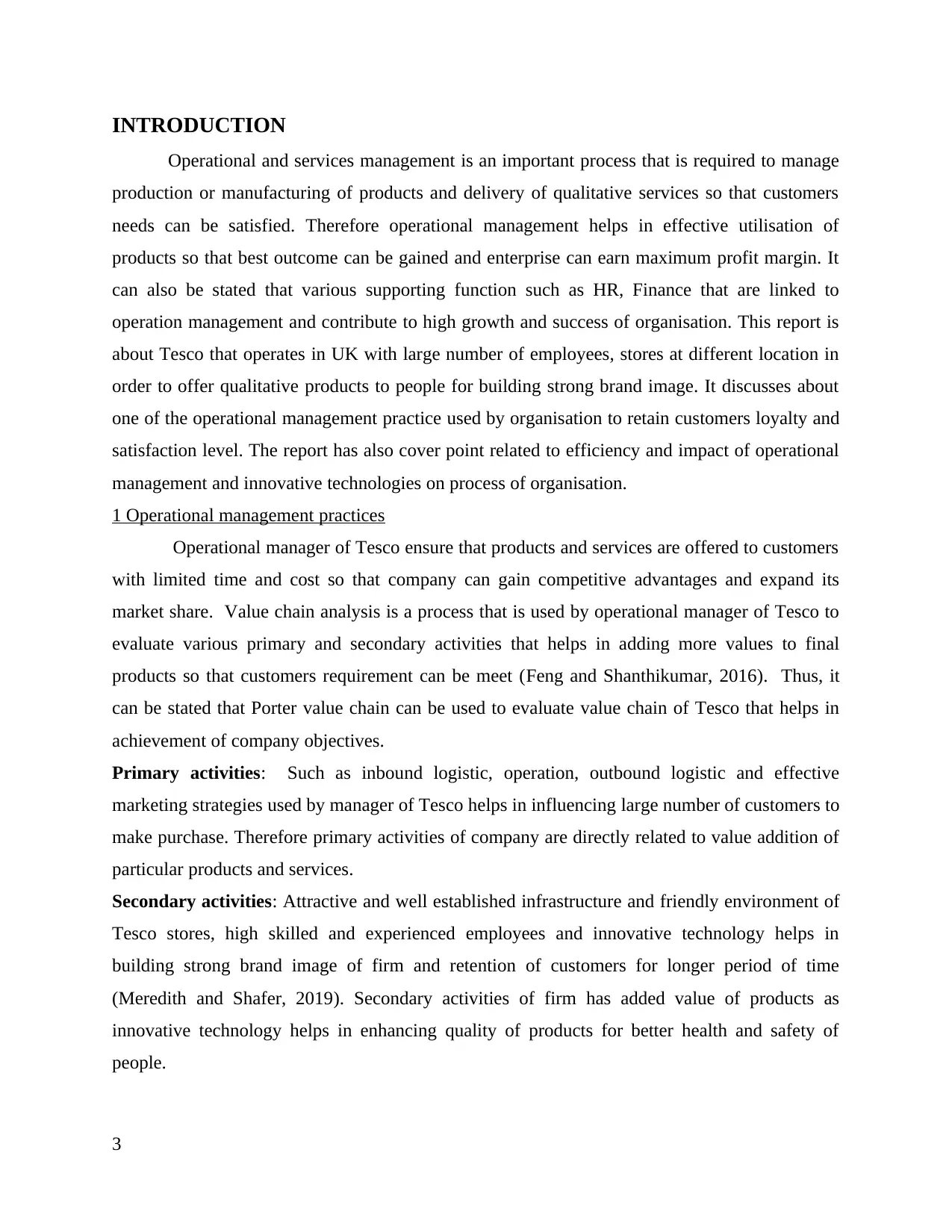
INTRODUCTION
Operational and services management is an important process that is required to manage
production or manufacturing of products and delivery of qualitative services so that customers
needs can be satisfied. Therefore operational management helps in effective utilisation of
products so that best outcome can be gained and enterprise can earn maximum profit margin. It
can also be stated that various supporting function such as HR, Finance that are linked to
operation management and contribute to high growth and success of organisation. This report is
about Tesco that operates in UK with large number of employees, stores at different location in
order to offer qualitative products to people for building strong brand image. It discusses about
one of the operational management practice used by organisation to retain customers loyalty and
satisfaction level. The report has also cover point related to efficiency and impact of operational
management and innovative technologies on process of organisation.
1 Operational management practices
Operational manager of Tesco ensure that products and services are offered to customers
with limited time and cost so that company can gain competitive advantages and expand its
market share. Value chain analysis is a process that is used by operational manager of Tesco to
evaluate various primary and secondary activities that helps in adding more values to final
products so that customers requirement can be meet (Feng and Shanthikumar, 2016). Thus, it
can be stated that Porter value chain can be used to evaluate value chain of Tesco that helps in
achievement of company objectives.
Primary activities: Such as inbound logistic, operation, outbound logistic and effective
marketing strategies used by manager of Tesco helps in influencing large number of customers to
make purchase. Therefore primary activities of company are directly related to value addition of
particular products and services.
Secondary activities: Attractive and well established infrastructure and friendly environment of
Tesco stores, high skilled and experienced employees and innovative technology helps in
building strong brand image of firm and retention of customers for longer period of time
(Meredith and Shafer, 2019). Secondary activities of firm has added value of products as
innovative technology helps in enhancing quality of products for better health and safety of
people.
3
Operational and services management is an important process that is required to manage
production or manufacturing of products and delivery of qualitative services so that customers
needs can be satisfied. Therefore operational management helps in effective utilisation of
products so that best outcome can be gained and enterprise can earn maximum profit margin. It
can also be stated that various supporting function such as HR, Finance that are linked to
operation management and contribute to high growth and success of organisation. This report is
about Tesco that operates in UK with large number of employees, stores at different location in
order to offer qualitative products to people for building strong brand image. It discusses about
one of the operational management practice used by organisation to retain customers loyalty and
satisfaction level. The report has also cover point related to efficiency and impact of operational
management and innovative technologies on process of organisation.
1 Operational management practices
Operational manager of Tesco ensure that products and services are offered to customers
with limited time and cost so that company can gain competitive advantages and expand its
market share. Value chain analysis is a process that is used by operational manager of Tesco to
evaluate various primary and secondary activities that helps in adding more values to final
products so that customers requirement can be meet (Feng and Shanthikumar, 2016). Thus, it
can be stated that Porter value chain can be used to evaluate value chain of Tesco that helps in
achievement of company objectives.
Primary activities: Such as inbound logistic, operation, outbound logistic and effective
marketing strategies used by manager of Tesco helps in influencing large number of customers to
make purchase. Therefore primary activities of company are directly related to value addition of
particular products and services.
Secondary activities: Attractive and well established infrastructure and friendly environment of
Tesco stores, high skilled and experienced employees and innovative technology helps in
building strong brand image of firm and retention of customers for longer period of time
(Meredith and Shafer, 2019). Secondary activities of firm has added value of products as
innovative technology helps in enhancing quality of products for better health and safety of
people.
3
⊘ This is a preview!⊘
Do you want full access?
Subscribe today to unlock all pages.

Trusted by 1+ million students worldwide
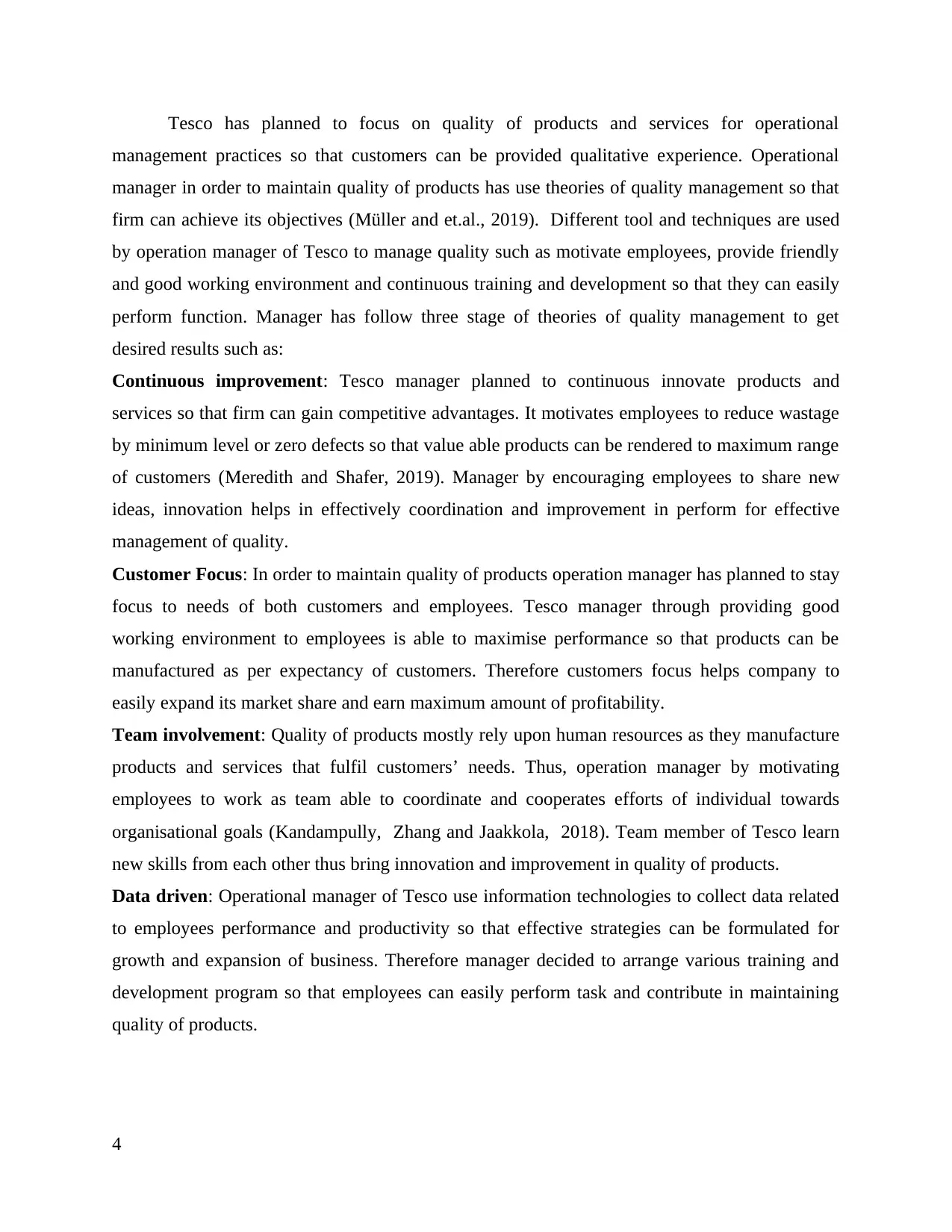
Tesco has planned to focus on quality of products and services for operational
management practices so that customers can be provided qualitative experience. Operational
manager in order to maintain quality of products has use theories of quality management so that
firm can achieve its objectives (Müller and et.al., 2019). Different tool and techniques are used
by operation manager of Tesco to manage quality such as motivate employees, provide friendly
and good working environment and continuous training and development so that they can easily
perform function. Manager has follow three stage of theories of quality management to get
desired results such as:
Continuous improvement: Tesco manager planned to continuous innovate products and
services so that firm can gain competitive advantages. It motivates employees to reduce wastage
by minimum level or zero defects so that value able products can be rendered to maximum range
of customers (Meredith and Shafer, 2019). Manager by encouraging employees to share new
ideas, innovation helps in effectively coordination and improvement in perform for effective
management of quality.
Customer Focus: In order to maintain quality of products operation manager has planned to stay
focus to needs of both customers and employees. Tesco manager through providing good
working environment to employees is able to maximise performance so that products can be
manufactured as per expectancy of customers. Therefore customers focus helps company to
easily expand its market share and earn maximum amount of profitability.
Team involvement: Quality of products mostly rely upon human resources as they manufacture
products and services that fulfil customers’ needs. Thus, operation manager by motivating
employees to work as team able to coordinate and cooperates efforts of individual towards
organisational goals (Kandampully, Zhang and Jaakkola, 2018). Team member of Tesco learn
new skills from each other thus bring innovation and improvement in quality of products.
Data driven: Operational manager of Tesco use information technologies to collect data related
to employees performance and productivity so that effective strategies can be formulated for
growth and expansion of business. Therefore manager decided to arrange various training and
development program so that employees can easily perform task and contribute in maintaining
quality of products.
4
management practices so that customers can be provided qualitative experience. Operational
manager in order to maintain quality of products has use theories of quality management so that
firm can achieve its objectives (Müller and et.al., 2019). Different tool and techniques are used
by operation manager of Tesco to manage quality such as motivate employees, provide friendly
and good working environment and continuous training and development so that they can easily
perform function. Manager has follow three stage of theories of quality management to get
desired results such as:
Continuous improvement: Tesco manager planned to continuous innovate products and
services so that firm can gain competitive advantages. It motivates employees to reduce wastage
by minimum level or zero defects so that value able products can be rendered to maximum range
of customers (Meredith and Shafer, 2019). Manager by encouraging employees to share new
ideas, innovation helps in effectively coordination and improvement in perform for effective
management of quality.
Customer Focus: In order to maintain quality of products operation manager has planned to stay
focus to needs of both customers and employees. Tesco manager through providing good
working environment to employees is able to maximise performance so that products can be
manufactured as per expectancy of customers. Therefore customers focus helps company to
easily expand its market share and earn maximum amount of profitability.
Team involvement: Quality of products mostly rely upon human resources as they manufacture
products and services that fulfil customers’ needs. Thus, operation manager by motivating
employees to work as team able to coordinate and cooperates efforts of individual towards
organisational goals (Kandampully, Zhang and Jaakkola, 2018). Team member of Tesco learn
new skills from each other thus bring innovation and improvement in quality of products.
Data driven: Operational manager of Tesco use information technologies to collect data related
to employees performance and productivity so that effective strategies can be formulated for
growth and expansion of business. Therefore manager decided to arrange various training and
development program so that employees can easily perform task and contribute in maintaining
quality of products.
4
Paraphrase This Document
Need a fresh take? Get an instant paraphrase of this document with our AI Paraphraser
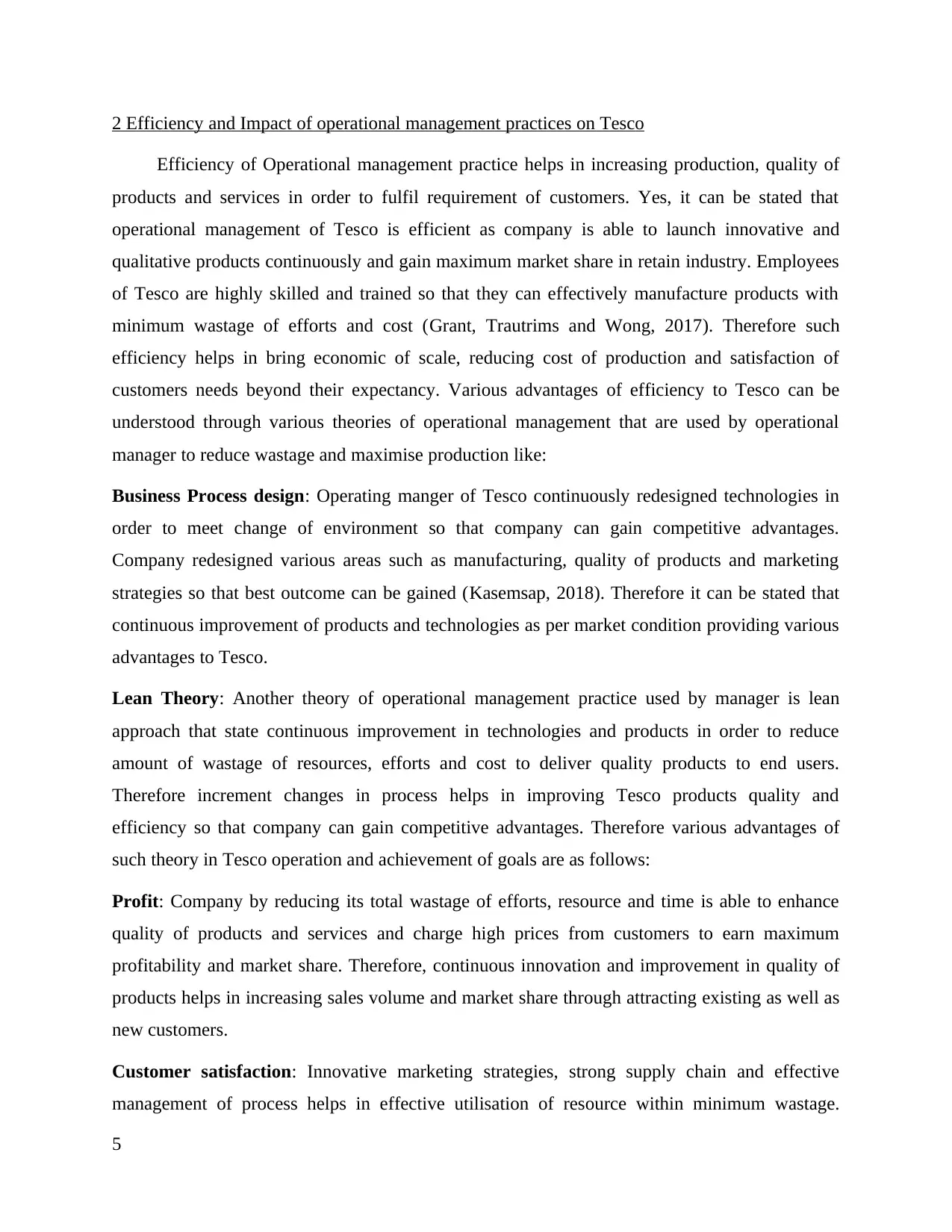
2 Efficiency and Impact of operational management practices on Tesco
Efficiency of Operational management practice helps in increasing production, quality of
products and services in order to fulfil requirement of customers. Yes, it can be stated that
operational management of Tesco is efficient as company is able to launch innovative and
qualitative products continuously and gain maximum market share in retain industry. Employees
of Tesco are highly skilled and trained so that they can effectively manufacture products with
minimum wastage of efforts and cost (Grant, Trautrims and Wong, 2017). Therefore such
efficiency helps in bring economic of scale, reducing cost of production and satisfaction of
customers needs beyond their expectancy. Various advantages of efficiency to Tesco can be
understood through various theories of operational management that are used by operational
manager to reduce wastage and maximise production like:
Business Process design: Operating manger of Tesco continuously redesigned technologies in
order to meet change of environment so that company can gain competitive advantages.
Company redesigned various areas such as manufacturing, quality of products and marketing
strategies so that best outcome can be gained (Kasemsap, 2018). Therefore it can be stated that
continuous improvement of products and technologies as per market condition providing various
advantages to Tesco.
Lean Theory: Another theory of operational management practice used by manager is lean
approach that state continuous improvement in technologies and products in order to reduce
amount of wastage of resources, efforts and cost to deliver quality products to end users.
Therefore increment changes in process helps in improving Tesco products quality and
efficiency so that company can gain competitive advantages. Therefore various advantages of
such theory in Tesco operation and achievement of goals are as follows:
Profit: Company by reducing its total wastage of efforts, resource and time is able to enhance
quality of products and services and charge high prices from customers to earn maximum
profitability and market share. Therefore, continuous innovation and improvement in quality of
products helps in increasing sales volume and market share through attracting existing as well as
new customers.
Customer satisfaction: Innovative marketing strategies, strong supply chain and effective
management of process helps in effective utilisation of resource within minimum wastage.
5
Efficiency of Operational management practice helps in increasing production, quality of
products and services in order to fulfil requirement of customers. Yes, it can be stated that
operational management of Tesco is efficient as company is able to launch innovative and
qualitative products continuously and gain maximum market share in retain industry. Employees
of Tesco are highly skilled and trained so that they can effectively manufacture products with
minimum wastage of efforts and cost (Grant, Trautrims and Wong, 2017). Therefore such
efficiency helps in bring economic of scale, reducing cost of production and satisfaction of
customers needs beyond their expectancy. Various advantages of efficiency to Tesco can be
understood through various theories of operational management that are used by operational
manager to reduce wastage and maximise production like:
Business Process design: Operating manger of Tesco continuously redesigned technologies in
order to meet change of environment so that company can gain competitive advantages.
Company redesigned various areas such as manufacturing, quality of products and marketing
strategies so that best outcome can be gained (Kasemsap, 2018). Therefore it can be stated that
continuous improvement of products and technologies as per market condition providing various
advantages to Tesco.
Lean Theory: Another theory of operational management practice used by manager is lean
approach that state continuous improvement in technologies and products in order to reduce
amount of wastage of resources, efforts and cost to deliver quality products to end users.
Therefore increment changes in process helps in improving Tesco products quality and
efficiency so that company can gain competitive advantages. Therefore various advantages of
such theory in Tesco operation and achievement of goals are as follows:
Profit: Company by reducing its total wastage of efforts, resource and time is able to enhance
quality of products and services and charge high prices from customers to earn maximum
profitability and market share. Therefore, continuous innovation and improvement in quality of
products helps in increasing sales volume and market share through attracting existing as well as
new customers.
Customer satisfaction: Innovative marketing strategies, strong supply chain and effective
management of process helps in effective utilisation of resource within minimum wastage.
5
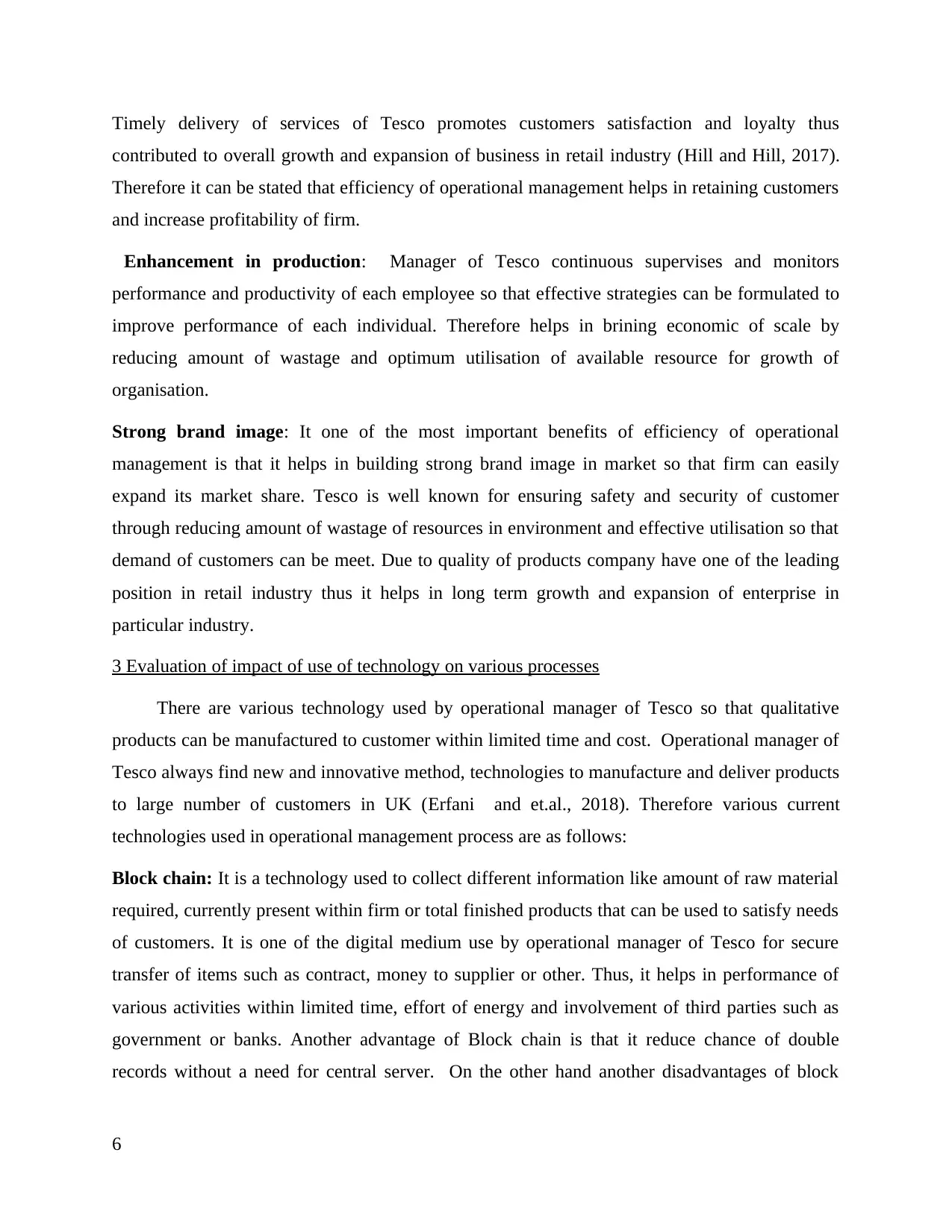
Timely delivery of services of Tesco promotes customers satisfaction and loyalty thus
contributed to overall growth and expansion of business in retail industry (Hill and Hill, 2017).
Therefore it can be stated that efficiency of operational management helps in retaining customers
and increase profitability of firm.
Enhancement in production: Manager of Tesco continuous supervises and monitors
performance and productivity of each employee so that effective strategies can be formulated to
improve performance of each individual. Therefore helps in brining economic of scale by
reducing amount of wastage and optimum utilisation of available resource for growth of
organisation.
Strong brand image: It one of the most important benefits of efficiency of operational
management is that it helps in building strong brand image in market so that firm can easily
expand its market share. Tesco is well known for ensuring safety and security of customer
through reducing amount of wastage of resources in environment and effective utilisation so that
demand of customers can be meet. Due to quality of products company have one of the leading
position in retail industry thus it helps in long term growth and expansion of enterprise in
particular industry.
3 Evaluation of impact of use of technology on various processes
There are various technology used by operational manager of Tesco so that qualitative
products can be manufactured to customer within limited time and cost. Operational manager of
Tesco always find new and innovative method, technologies to manufacture and deliver products
to large number of customers in UK (Erfani and et.al., 2018). Therefore various current
technologies used in operational management process are as follows:
Block chain: It is a technology used to collect different information like amount of raw material
required, currently present within firm or total finished products that can be used to satisfy needs
of customers. It is one of the digital medium use by operational manager of Tesco for secure
transfer of items such as contract, money to supplier or other. Thus, it helps in performance of
various activities within limited time, effort of energy and involvement of third parties such as
government or banks. Another advantage of Block chain is that it reduce chance of double
records without a need for central server. On the other hand another disadvantages of block
6
contributed to overall growth and expansion of business in retail industry (Hill and Hill, 2017).
Therefore it can be stated that efficiency of operational management helps in retaining customers
and increase profitability of firm.
Enhancement in production: Manager of Tesco continuous supervises and monitors
performance and productivity of each employee so that effective strategies can be formulated to
improve performance of each individual. Therefore helps in brining economic of scale by
reducing amount of wastage and optimum utilisation of available resource for growth of
organisation.
Strong brand image: It one of the most important benefits of efficiency of operational
management is that it helps in building strong brand image in market so that firm can easily
expand its market share. Tesco is well known for ensuring safety and security of customer
through reducing amount of wastage of resources in environment and effective utilisation so that
demand of customers can be meet. Due to quality of products company have one of the leading
position in retail industry thus it helps in long term growth and expansion of enterprise in
particular industry.
3 Evaluation of impact of use of technology on various processes
There are various technology used by operational manager of Tesco so that qualitative
products can be manufactured to customer within limited time and cost. Operational manager of
Tesco always find new and innovative method, technologies to manufacture and deliver products
to large number of customers in UK (Erfani and et.al., 2018). Therefore various current
technologies used in operational management process are as follows:
Block chain: It is a technology used to collect different information like amount of raw material
required, currently present within firm or total finished products that can be used to satisfy needs
of customers. It is one of the digital medium use by operational manager of Tesco for secure
transfer of items such as contract, money to supplier or other. Thus, it helps in performance of
various activities within limited time, effort of energy and involvement of third parties such as
government or banks. Another advantage of Block chain is that it reduce chance of double
records without a need for central server. On the other hand another disadvantages of block
6
⊘ This is a preview!⊘
Do you want full access?
Subscribe today to unlock all pages.

Trusted by 1+ million students worldwide
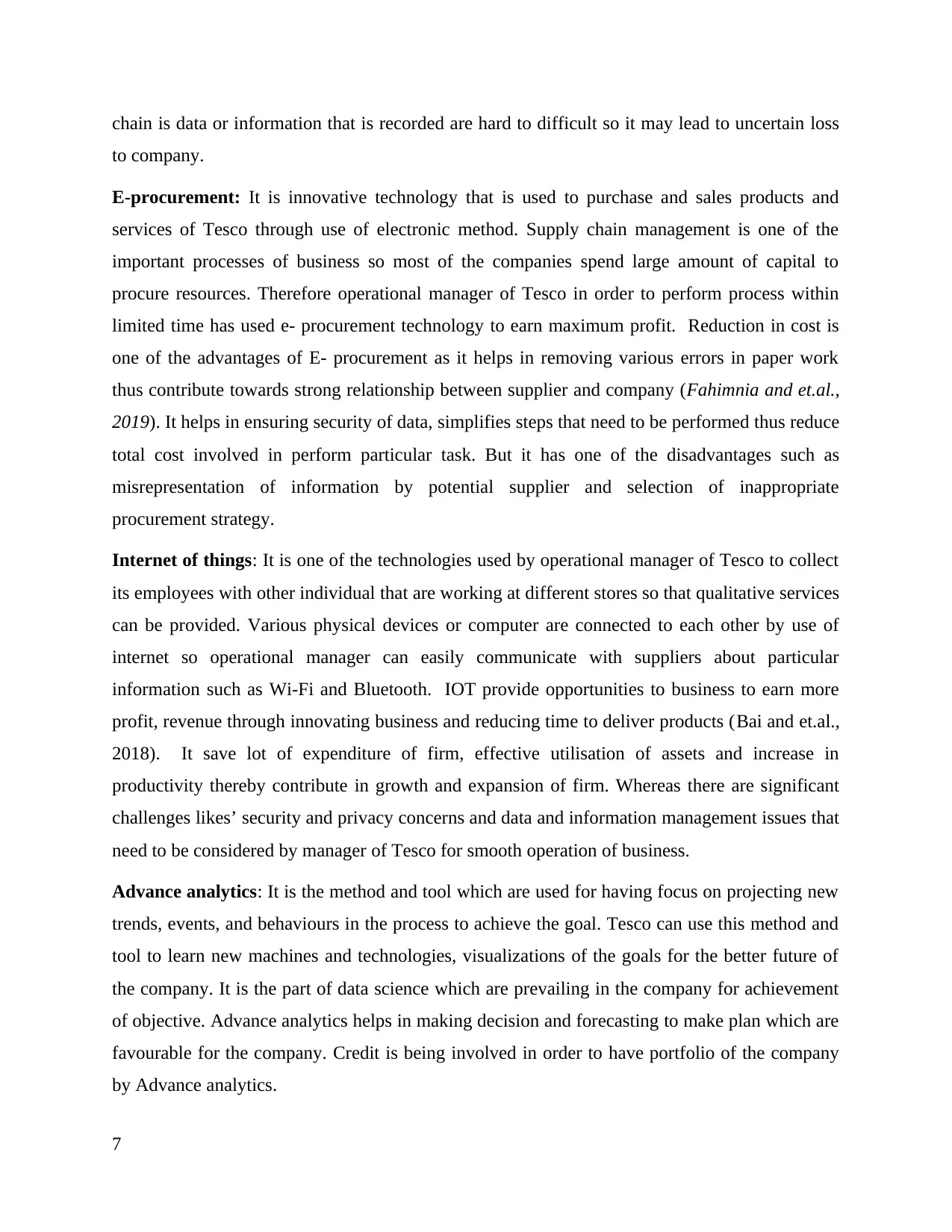
chain is data or information that is recorded are hard to difficult so it may lead to uncertain loss
to company.
E-procurement: It is innovative technology that is used to purchase and sales products and
services of Tesco through use of electronic method. Supply chain management is one of the
important processes of business so most of the companies spend large amount of capital to
procure resources. Therefore operational manager of Tesco in order to perform process within
limited time has used e- procurement technology to earn maximum profit. Reduction in cost is
one of the advantages of E- procurement as it helps in removing various errors in paper work
thus contribute towards strong relationship between supplier and company (Fahimnia and et.al.,
2019). It helps in ensuring security of data, simplifies steps that need to be performed thus reduce
total cost involved in perform particular task. But it has one of the disadvantages such as
misrepresentation of information by potential supplier and selection of inappropriate
procurement strategy.
Internet of things: It is one of the technologies used by operational manager of Tesco to collect
its employees with other individual that are working at different stores so that qualitative services
can be provided. Various physical devices or computer are connected to each other by use of
internet so operational manager can easily communicate with suppliers about particular
information such as Wi-Fi and Bluetooth. IOT provide opportunities to business to earn more
profit, revenue through innovating business and reducing time to deliver products (Bai and et.al.,
2018). It save lot of expenditure of firm, effective utilisation of assets and increase in
productivity thereby contribute in growth and expansion of firm. Whereas there are significant
challenges likes’ security and privacy concerns and data and information management issues that
need to be considered by manager of Tesco for smooth operation of business.
Advance analytics: It is the method and tool which are used for having focus on projecting new
trends, events, and behaviours in the process to achieve the goal. Tesco can use this method and
tool to learn new machines and technologies, visualizations of the goals for the better future of
the company. It is the part of data science which are prevailing in the company for achievement
of objective. Advance analytics helps in making decision and forecasting to make plan which are
favourable for the company. Credit is being involved in order to have portfolio of the company
by Advance analytics.
7
to company.
E-procurement: It is innovative technology that is used to purchase and sales products and
services of Tesco through use of electronic method. Supply chain management is one of the
important processes of business so most of the companies spend large amount of capital to
procure resources. Therefore operational manager of Tesco in order to perform process within
limited time has used e- procurement technology to earn maximum profit. Reduction in cost is
one of the advantages of E- procurement as it helps in removing various errors in paper work
thus contribute towards strong relationship between supplier and company (Fahimnia and et.al.,
2019). It helps in ensuring security of data, simplifies steps that need to be performed thus reduce
total cost involved in perform particular task. But it has one of the disadvantages such as
misrepresentation of information by potential supplier and selection of inappropriate
procurement strategy.
Internet of things: It is one of the technologies used by operational manager of Tesco to collect
its employees with other individual that are working at different stores so that qualitative services
can be provided. Various physical devices or computer are connected to each other by use of
internet so operational manager can easily communicate with suppliers about particular
information such as Wi-Fi and Bluetooth. IOT provide opportunities to business to earn more
profit, revenue through innovating business and reducing time to deliver products (Bai and et.al.,
2018). It save lot of expenditure of firm, effective utilisation of assets and increase in
productivity thereby contribute in growth and expansion of firm. Whereas there are significant
challenges likes’ security and privacy concerns and data and information management issues that
need to be considered by manager of Tesco for smooth operation of business.
Advance analytics: It is the method and tool which are used for having focus on projecting new
trends, events, and behaviours in the process to achieve the goal. Tesco can use this method and
tool to learn new machines and technologies, visualizations of the goals for the better future of
the company. It is the part of data science which are prevailing in the company for achievement
of objective. Advance analytics helps in making decision and forecasting to make plan which are
favourable for the company. Credit is being involved in order to have portfolio of the company
by Advance analytics.
7
Paraphrase This Document
Need a fresh take? Get an instant paraphrase of this document with our AI Paraphraser
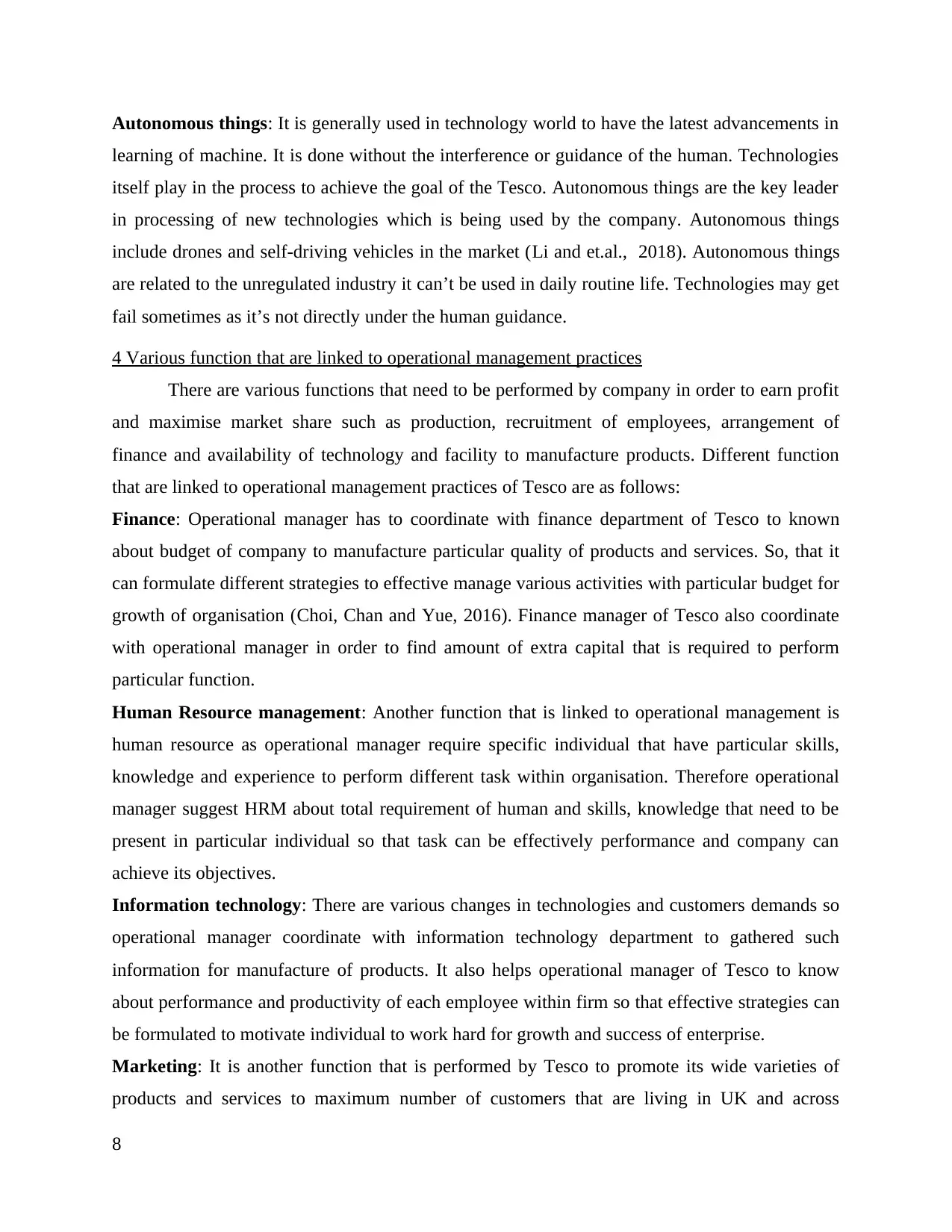
Autonomous things: It is generally used in technology world to have the latest advancements in
learning of machine. It is done without the interference or guidance of the human. Technologies
itself play in the process to achieve the goal of the Tesco. Autonomous things are the key leader
in processing of new technologies which is being used by the company. Autonomous things
include drones and self-driving vehicles in the market (Li and et.al., 2018). Autonomous things
are related to the unregulated industry it can’t be used in daily routine life. Technologies may get
fail sometimes as it’s not directly under the human guidance.
4 Various function that are linked to operational management practices
There are various functions that need to be performed by company in order to earn profit
and maximise market share such as production, recruitment of employees, arrangement of
finance and availability of technology and facility to manufacture products. Different function
that are linked to operational management practices of Tesco are as follows:
Finance: Operational manager has to coordinate with finance department of Tesco to known
about budget of company to manufacture particular quality of products and services. So, that it
can formulate different strategies to effective manage various activities with particular budget for
growth of organisation (Choi, Chan and Yue, 2016). Finance manager of Tesco also coordinate
with operational manager in order to find amount of extra capital that is required to perform
particular function.
Human Resource management: Another function that is linked to operational management is
human resource as operational manager require specific individual that have particular skills,
knowledge and experience to perform different task within organisation. Therefore operational
manager suggest HRM about total requirement of human and skills, knowledge that need to be
present in particular individual so that task can be effectively performance and company can
achieve its objectives.
Information technology: There are various changes in technologies and customers demands so
operational manager coordinate with information technology department to gathered such
information for manufacture of products. It also helps operational manager of Tesco to know
about performance and productivity of each employee within firm so that effective strategies can
be formulated to motivate individual to work hard for growth and success of enterprise.
Marketing: It is another function that is performed by Tesco to promote its wide varieties of
products and services to maximum number of customers that are living in UK and across
8
learning of machine. It is done without the interference or guidance of the human. Technologies
itself play in the process to achieve the goal of the Tesco. Autonomous things are the key leader
in processing of new technologies which is being used by the company. Autonomous things
include drones and self-driving vehicles in the market (Li and et.al., 2018). Autonomous things
are related to the unregulated industry it can’t be used in daily routine life. Technologies may get
fail sometimes as it’s not directly under the human guidance.
4 Various function that are linked to operational management practices
There are various functions that need to be performed by company in order to earn profit
and maximise market share such as production, recruitment of employees, arrangement of
finance and availability of technology and facility to manufacture products. Different function
that are linked to operational management practices of Tesco are as follows:
Finance: Operational manager has to coordinate with finance department of Tesco to known
about budget of company to manufacture particular quality of products and services. So, that it
can formulate different strategies to effective manage various activities with particular budget for
growth of organisation (Choi, Chan and Yue, 2016). Finance manager of Tesco also coordinate
with operational manager in order to find amount of extra capital that is required to perform
particular function.
Human Resource management: Another function that is linked to operational management is
human resource as operational manager require specific individual that have particular skills,
knowledge and experience to perform different task within organisation. Therefore operational
manager suggest HRM about total requirement of human and skills, knowledge that need to be
present in particular individual so that task can be effectively performance and company can
achieve its objectives.
Information technology: There are various changes in technologies and customers demands so
operational manager coordinate with information technology department to gathered such
information for manufacture of products. It also helps operational manager of Tesco to know
about performance and productivity of each employee within firm so that effective strategies can
be formulated to motivate individual to work hard for growth and success of enterprise.
Marketing: It is another function that is performed by Tesco to promote its wide varieties of
products and services to maximum number of customers that are living in UK and across
8
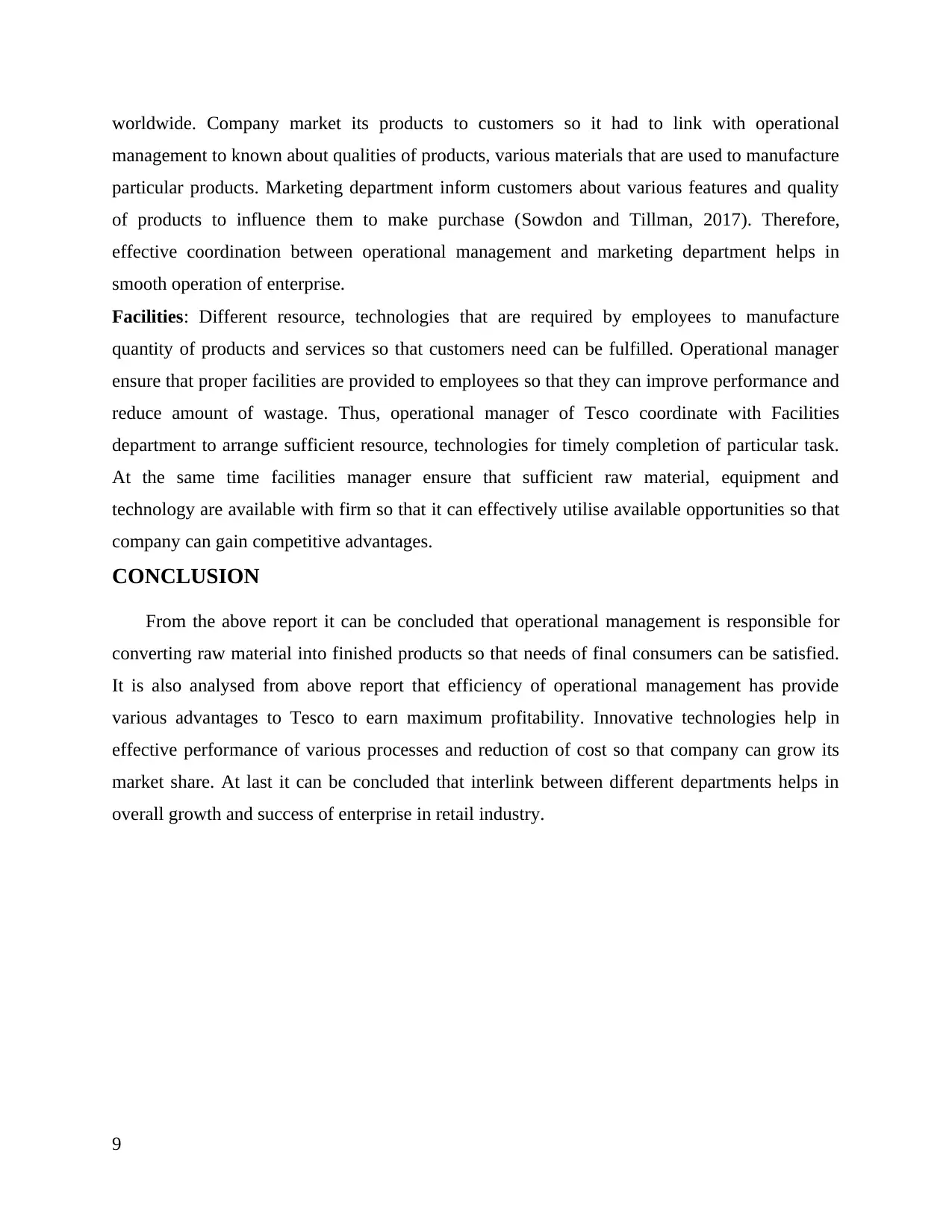
worldwide. Company market its products to customers so it had to link with operational
management to known about qualities of products, various materials that are used to manufacture
particular products. Marketing department inform customers about various features and quality
of products to influence them to make purchase (Sowdon and Tillman, 2017). Therefore,
effective coordination between operational management and marketing department helps in
smooth operation of enterprise.
Facilities: Different resource, technologies that are required by employees to manufacture
quantity of products and services so that customers need can be fulfilled. Operational manager
ensure that proper facilities are provided to employees so that they can improve performance and
reduce amount of wastage. Thus, operational manager of Tesco coordinate with Facilities
department to arrange sufficient resource, technologies for timely completion of particular task.
At the same time facilities manager ensure that sufficient raw material, equipment and
technology are available with firm so that it can effectively utilise available opportunities so that
company can gain competitive advantages.
CONCLUSION
From the above report it can be concluded that operational management is responsible for
converting raw material into finished products so that needs of final consumers can be satisfied.
It is also analysed from above report that efficiency of operational management has provide
various advantages to Tesco to earn maximum profitability. Innovative technologies help in
effective performance of various processes and reduction of cost so that company can grow its
market share. At last it can be concluded that interlink between different departments helps in
overall growth and success of enterprise in retail industry.
9
management to known about qualities of products, various materials that are used to manufacture
particular products. Marketing department inform customers about various features and quality
of products to influence them to make purchase (Sowdon and Tillman, 2017). Therefore,
effective coordination between operational management and marketing department helps in
smooth operation of enterprise.
Facilities: Different resource, technologies that are required by employees to manufacture
quantity of products and services so that customers need can be fulfilled. Operational manager
ensure that proper facilities are provided to employees so that they can improve performance and
reduce amount of wastage. Thus, operational manager of Tesco coordinate with Facilities
department to arrange sufficient resource, technologies for timely completion of particular task.
At the same time facilities manager ensure that sufficient raw material, equipment and
technology are available with firm so that it can effectively utilise available opportunities so that
company can gain competitive advantages.
CONCLUSION
From the above report it can be concluded that operational management is responsible for
converting raw material into finished products so that needs of final consumers can be satisfied.
It is also analysed from above report that efficiency of operational management has provide
various advantages to Tesco to earn maximum profitability. Innovative technologies help in
effective performance of various processes and reduction of cost so that company can grow its
market share. At last it can be concluded that interlink between different departments helps in
overall growth and success of enterprise in retail industry.
9
⊘ This is a preview!⊘
Do you want full access?
Subscribe today to unlock all pages.

Trusted by 1+ million students worldwide
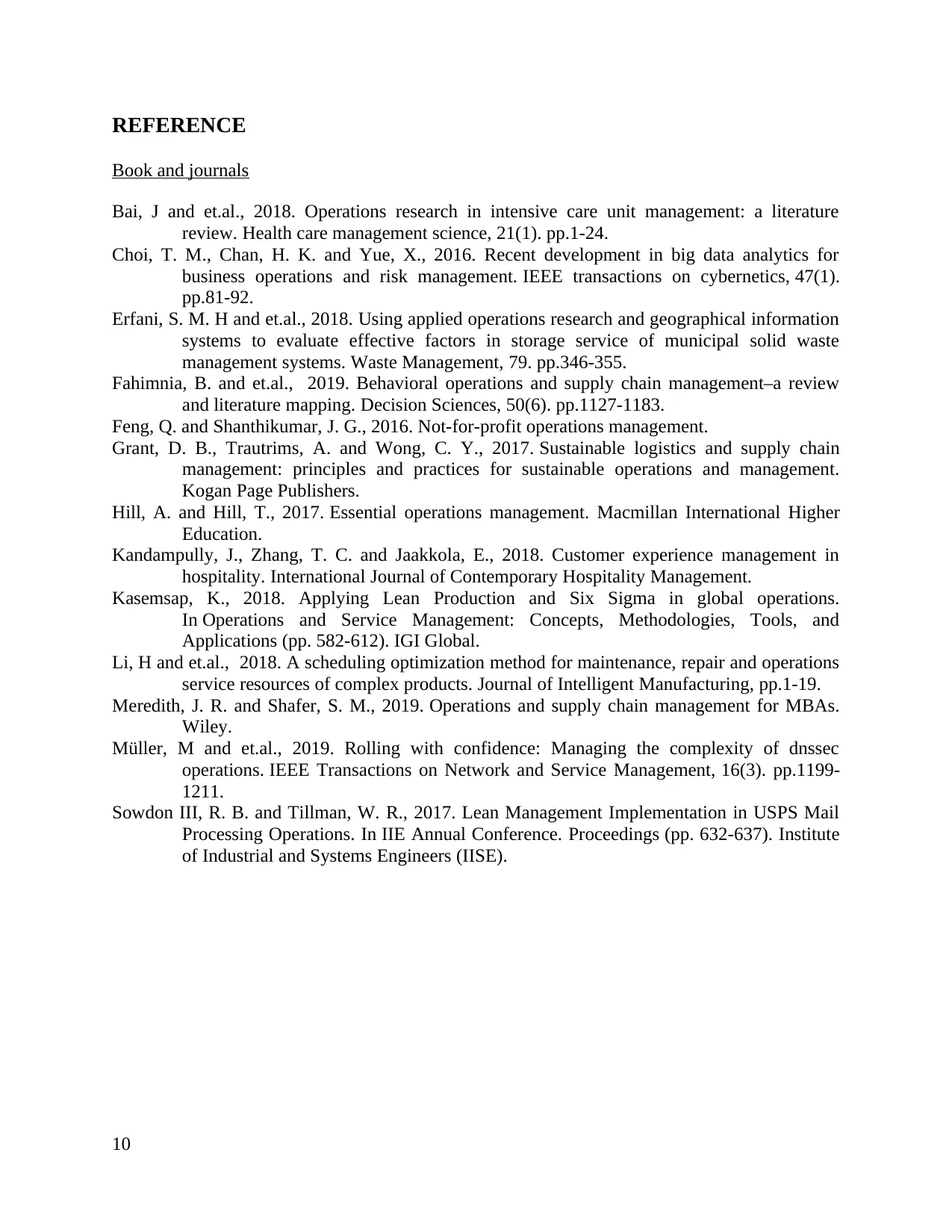
REFERENCE
Book and journals
Bai, J and et.al., 2018. Operations research in intensive care unit management: a literature
review. Health care management science, 21(1). pp.1-24.
Choi, T. M., Chan, H. K. and Yue, X., 2016. Recent development in big data analytics for
business operations and risk management. IEEE transactions on cybernetics, 47(1).
pp.81-92.
Erfani, S. M. H and et.al., 2018. Using applied operations research and geographical information
systems to evaluate effective factors in storage service of municipal solid waste
management systems. Waste Management, 79. pp.346-355.
Fahimnia, B. and et.al., 2019. Behavioral operations and supply chain management–a review
and literature mapping. Decision Sciences, 50(6). pp.1127-1183.
Feng, Q. and Shanthikumar, J. G., 2016. Not-for-profit operations management.
Grant, D. B., Trautrims, A. and Wong, C. Y., 2017. Sustainable logistics and supply chain
management: principles and practices for sustainable operations and management.
Kogan Page Publishers.
Hill, A. and Hill, T., 2017. Essential operations management. Macmillan International Higher
Education.
Kandampully, J., Zhang, T. C. and Jaakkola, E., 2018. Customer experience management in
hospitality. International Journal of Contemporary Hospitality Management.
Kasemsap, K., 2018. Applying Lean Production and Six Sigma in global operations.
In Operations and Service Management: Concepts, Methodologies, Tools, and
Applications (pp. 582-612). IGI Global.
Li, H and et.al., 2018. A scheduling optimization method for maintenance, repair and operations
service resources of complex products. Journal of Intelligent Manufacturing, pp.1-19.
Meredith, J. R. and Shafer, S. M., 2019. Operations and supply chain management for MBAs.
Wiley.
Müller, M and et.al., 2019. Rolling with confidence: Managing the complexity of dnssec
operations. IEEE Transactions on Network and Service Management, 16(3). pp.1199-
1211.
Sowdon III, R. B. and Tillman, W. R., 2017. Lean Management Implementation in USPS Mail
Processing Operations. In IIE Annual Conference. Proceedings (pp. 632-637). Institute
of Industrial and Systems Engineers (IISE).
10
Book and journals
Bai, J and et.al., 2018. Operations research in intensive care unit management: a literature
review. Health care management science, 21(1). pp.1-24.
Choi, T. M., Chan, H. K. and Yue, X., 2016. Recent development in big data analytics for
business operations and risk management. IEEE transactions on cybernetics, 47(1).
pp.81-92.
Erfani, S. M. H and et.al., 2018. Using applied operations research and geographical information
systems to evaluate effective factors in storage service of municipal solid waste
management systems. Waste Management, 79. pp.346-355.
Fahimnia, B. and et.al., 2019. Behavioral operations and supply chain management–a review
and literature mapping. Decision Sciences, 50(6). pp.1127-1183.
Feng, Q. and Shanthikumar, J. G., 2016. Not-for-profit operations management.
Grant, D. B., Trautrims, A. and Wong, C. Y., 2017. Sustainable logistics and supply chain
management: principles and practices for sustainable operations and management.
Kogan Page Publishers.
Hill, A. and Hill, T., 2017. Essential operations management. Macmillan International Higher
Education.
Kandampully, J., Zhang, T. C. and Jaakkola, E., 2018. Customer experience management in
hospitality. International Journal of Contemporary Hospitality Management.
Kasemsap, K., 2018. Applying Lean Production and Six Sigma in global operations.
In Operations and Service Management: Concepts, Methodologies, Tools, and
Applications (pp. 582-612). IGI Global.
Li, H and et.al., 2018. A scheduling optimization method for maintenance, repair and operations
service resources of complex products. Journal of Intelligent Manufacturing, pp.1-19.
Meredith, J. R. and Shafer, S. M., 2019. Operations and supply chain management for MBAs.
Wiley.
Müller, M and et.al., 2019. Rolling with confidence: Managing the complexity of dnssec
operations. IEEE Transactions on Network and Service Management, 16(3). pp.1199-
1211.
Sowdon III, R. B. and Tillman, W. R., 2017. Lean Management Implementation in USPS Mail
Processing Operations. In IIE Annual Conference. Proceedings (pp. 632-637). Institute
of Industrial and Systems Engineers (IISE).
10
Paraphrase This Document
Need a fresh take? Get an instant paraphrase of this document with our AI Paraphraser

11
1 out of 11
Related Documents
Your All-in-One AI-Powered Toolkit for Academic Success.
+13062052269
info@desklib.com
Available 24*7 on WhatsApp / Email
![[object Object]](/_next/static/media/star-bottom.7253800d.svg)
Unlock your academic potential
Copyright © 2020–2026 A2Z Services. All Rights Reserved. Developed and managed by ZUCOL.




